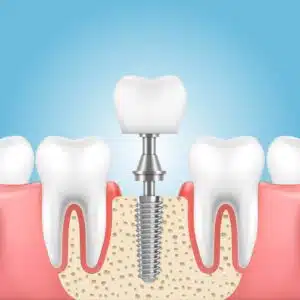Wearing a mouth guard at night can be helpful, but many patients ask, “Is Sleeping With a Mouth Guard Dangerous?” In this guide, we’ll explain what mouth guards do, the potential risks, how to avoid them, and when to consult a professional.
At OrthoDental Inc., patient safety and comfort are top priorities, so we want you to make an informed decision before you commit to wearing one.

What Is a Mouth Guard & Is Sleeping With a Mouth Guard Dangerous?
A dental mouth guard, sometimes called a night guard, bite guard, or occlusal splint, is a dental device that fits over your teeth. It’s most commonly worn at night while you sleep. These devices serve a variety of purposes:
- Protecting against teeth grinding (bruxism). Grinding can cause enamel wear, tooth fractures, headaches, and jaw pain. A mouth guard acts as a barrier that absorbs pressure and preventing damage.
- Relieving TMJ discomfort. Temporomandibular joint (TMJ) disorders often cause jaw tension, clicking, and soreness. A properly fitted mouth guard can help reduce this strain.
- Protecting dental restorations. If you’ve invested in crowns, bridges, veneers, or implants, a mouth guard helps protect them from damage caused by clenching or grinding.
- Improving sleep-related issues. In certain cases, mouth guards are used to reduce snoring or help manage mild sleep apnea by slightly repositioning the jaw or tongue.
What Are the Risks of Sleeping With a Mouth Guard at Night?
When fitted correctly and maintained properly, oral mouth guards are safe for the majority of people. However, they are not without potential risks, such as:
Poor Fit
If your guard doesn’t align with your bite, it can cause gum irritation, tooth soreness, or even worsen your jaw alignment over time. Over-the-counter guards are more likely to have this problem compared to custom-made versions.
Jaw Fatigue or Pain
Wearing a guard that forces your jaw into an unnatural position can strain muscles or joints. Some people may wake up with sore jaws or tension headaches, especially when they first start using one.
Saliva Changes
At first, many people drool more than usual while wearing a new guard. Others may develop a dry mouth due to mouth breathing. These side effects are not usually dangerous but can be frustrating.
Long-Term Bite Changes
If a mouth guard is worn for years without professional monitoring, subtle shifts in how your upper and lower teeth meet can occur.
Hygiene Risks
A guard that isn’t cleaned properly can become a breeding ground for bacteria, leading to bad breath, gum irritation, or even infections.
Airway Concerns
For people with sleep apnea or nasal obstruction, an ill-fitting guard might make breathing harder during sleep.
So, can sleeping with a mouth guard be harmful? The answer is yes, but most of these risks can be prevented with proper care and professional oversight.
Is It Dangerous to Sleep With a Mouth Guard?
For most people, the answer to “Is Sleeping With a Mouth Guard Dangerous?” is no. In fact, many patients benefit from improved oral health and reduced discomfort. Risks arise, however, if the wrong type of guard is used, if the device is poorly maintained, or if underlying conditions are overlooked.
For example, a store-bought guard that doesn’t fit well can irritate gums and worsen bite issues. A guard that isn’t cleaned properly may harbor harmful bacteria. And for patients with sleep apnea, certain guards could block the airway, making the condition worse.
That’s why OrthoDental Inc. strongly recommends a professional consultation before choosing a mouth guard. With expert evaluation, the risks are minimized, and the long-term benefits are maximized.
What Type of Mouth Guard Is Best?
Not all guards are created equal, and this often raises the question: “Is Sleeping With a Mouth Guard Dangerous?” The safest and most effective choice is a custom-fitted mouth guard made by a dentist. Crafted from a mold of your teeth, it ensures a precise fit, greater comfort, and reduced risk of irritation while offering superior protection.
While over-the-counter “boil-and-bite” guards may work for some, they are less accurate, less durable, and more likely to cause bite or comfort issues. Stock guards, or one-size-fits-all options, are not recommended for long-term use since they rarely fit properly.
The material of the guard also plays a role. High-quality, non-toxic, and easy-to-clean materials provide safer and more reliable protection. A well-made custom guard not only lasts longer but also minimizes risks while maximizing benefits.
Another important factor is regular dental check-ups. Teeth shift, and guards wear out over time. At OrthoDental Inc., patients are encouraged to bring in their guards for evaluation so adjustments can be made if necessary.
How to Use It Safely
If you want to minimize the risks and are wondering, “Is Sleeping With a Mouth Guard Dangerous?”, here are a few important tips to stay safe:
- Always follow professional advice. If your guard was made by OrthoDental Inc., follow all care instructions and come in for regular check-ups.
- Keep it clean. Rinse after every use, gently brush with a non-abrasive cleanser, and let it dry completely before storage.
- Disinfect periodically. Use a dentist-approved solution to keep bacteria away.
- Inspect regularly. Cracks, warping, or rough edges are signs it’s time for a replacement.
- Don’t ignore discomfort. Persistent soreness, pain, or breathing issues should be evaluated immediately.
- Allow adjustment time. Some drooling or discomfort is normal at first, but this should improve within a few nights.
By following these steps, most people can use a mouth guard safely and comfortably.
When to Get Professional Help
Many patients ask, “Is Sleeping With a Mouth Guard Dangerous?” While it’s generally safe, you should see a dentist if you experience ongoing jaw pain, facial soreness, or headaches from using your guard. If your bite feels different or off, that’s a clear sign your guard may not be fitting correctly.
Breathing difficulties are another red flag, especially for patients with sleep apnea. And if your guard shows visible signs of damage or develops an odor even after cleaning, it’s time for a replacement.
At OrthoDental Inc., we specialize in creating safe, effective, and comfortable guards that minimize risks and maximize long-term benefits.
FAQs
- Is it dangerous to sleep with a mouth guard every night?
Not if it’s properly fitted and maintained. In fact, most people benefit from nightly use. - Can wearing a mouth guard cause problems for my teeth?
If the guard doesn’t fit properly or is worn too long without adjustments, it can potentially change your bite or cause irritation. - Can a dirty mouth guard make you sick?
Yes. A poorly cleaned guard can harbor bacteria that may lead to bad breath, gum problems, or infections. - Should I get a store-bought guard or a custom one?
Custom guards are safer and more effective. Over-the-counter versions may be less expensive but carry more risks. - How long does a mouth guard last?
With proper care, a high-quality guard can last several years, but regular dental evaluations are important to know when it’s time for a replacement.
Get Your Mouth Guard Custom-Fitted at OrthoDental Inc.
A well-made, well-maintained guard protects teeth, reduces discomfort, and can even improve sleep quality. The safest path forward is to consult with a dental professional. At OrthoDental Inc., we provide custom solutions designed to protect your oral health while keeping you safe and comfortable. If you’re considering a mouth guard, schedule a consultation today and get expert advice tailored to your needs.




